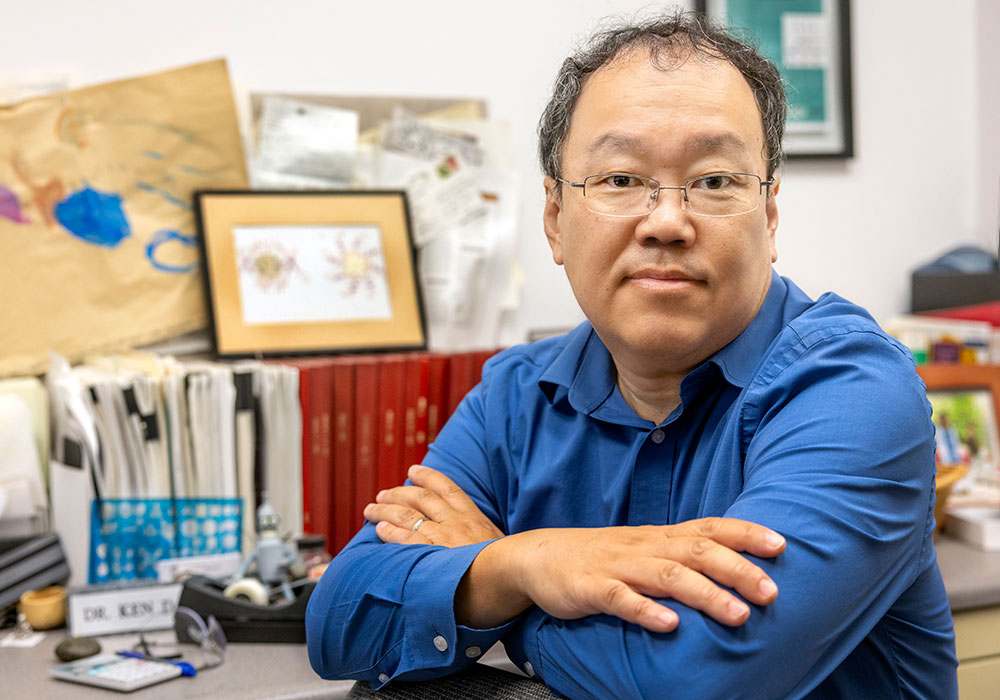Ask Ken Shimizu the secret to teaching organic chemistry, and the winner of 2024 Michael J. Mungo Distinguished Professor award won’t launch into a lecture. And if you start by asking about his research, forget it. He’ll just smile, adjust his glasses and shrug off the question: “Yeah, we don’t need to get into all of that.”
He's not being coy. As quickly as he tells you not to worry about the Shimizu Group’s research in supramolecular chemistry — or “the chemistry beyond the molecule,” as he puts it — Shimizu explains his lab’s research in such simple terms that a humanities major could understand.
“Most properties of molecules are not from one single molecule. They’re usually from a collection of molecules,” he says. “What we're trying to do is measure the attraction or the repulsion of individual molecules. And that's really hard because they're small and the attraction actually is quite weak. So in order to make those measurements, we make molecules that will make the measurements for us.”
Molecules measuring molecules? It’s an intriguing idea, whether you’re an organic chemistry graduate student helping conduct experiments or an English major that wandered into the wrong class. You want to know more.
And if you press him, he’ll oblige. He’ll slowly explain how the interaction of molecules determines many of the important properties that we observe and how those properties have applications from health care to industry. But if you want to talk about teaching, he’d just as soon change the subject.
I tell my undergraduates not to treat the class like a science class. Treat it like a language class. Organic chemistry builds on itself. You really need to know the vocabulary at the beginning. Then the grammar. And then we're going to start applying it and introducing complexity.
“I tell my undergraduates not to treat the class like a science class,” he says. “Treat it like a language class. Organic chemistry builds on itself. You really need to know the vocabulary at the beginning. Then the grammar. And then we're going to start applying it and introducing complexity.”
An education professor would call his building block approach “scaffolding,” but like many professors who began the teaching part of their career in graduate school, Shimizu is largely self-taught when it comes to pedagogy. In fact, when he first learned he had won the the most prestigious teaching award given at USC, he thought it was a prank.
“I didn't know what I was doing was called scaffolding until two or three years ago,” he admits with a chuckle. “I was just providing a pathway to learn the material and apply the material.”
Maybe he comes by it naturally: His father was a professor of pharmacy. Wherever the talent came from, Shimizu chalks up his desire to improve — at least initially — to fear. As he was preparing to teach his very first class as a graduate student at MIT back in 1997, the thought of failure was never far from mind.
To compound that anxiety, he was also very young — and looked even younger. “When I went to lunch with my colleagues, someone’s wife mistook me not for an undergraduate student, but like a high school student,” he says. “So I tried to dress up a little bit, just to distinguish myself from the students.”
He also did his homework. That first semester, he sometimes found himself just a couple of chapters ahead of his students, but that made him work that much harder. It wasn’t enough to know more than his students; he needed to see the difficulties of organic chemistry from the perspective of someone who hadn’t already devoted years of study to the subject.
“It’s one thing to learn something; it's altogether another thing to teach it,” he says. “I probably put more time into teaching in the beginning than on research because of fear — fear of failure in front of a whole classroom of people.”
Twenty-seven years later, he’s a classroom veteran. He is still surprised by some of the questions he encounters, but he tries to approach them as opportunities to understand where and how the material is difficult for undergraduates. He also devotes a lot of energy to making sure his students learn more than just organic chemistry, whether they're among the 80 students enrolled in his intro level organic chemistry course or part of a smaller South Carolina Honors College class.
“I tell the class in general, many of you will probably not use a lot of this material in the future,” he says, “but I hope that the way you study, the way you approached this class, the methods and strategies that you used, will be helpful for you in the future.”
